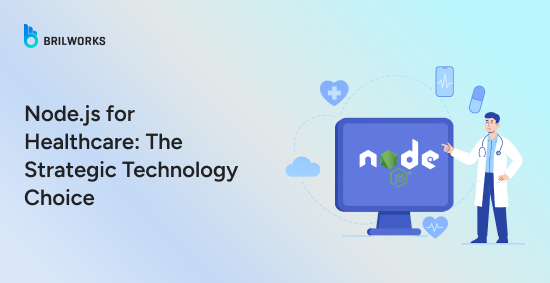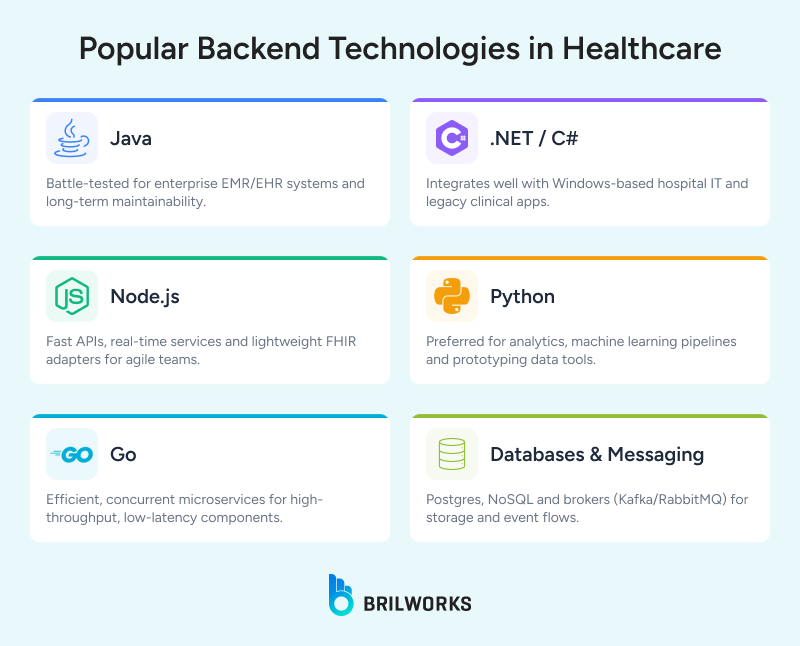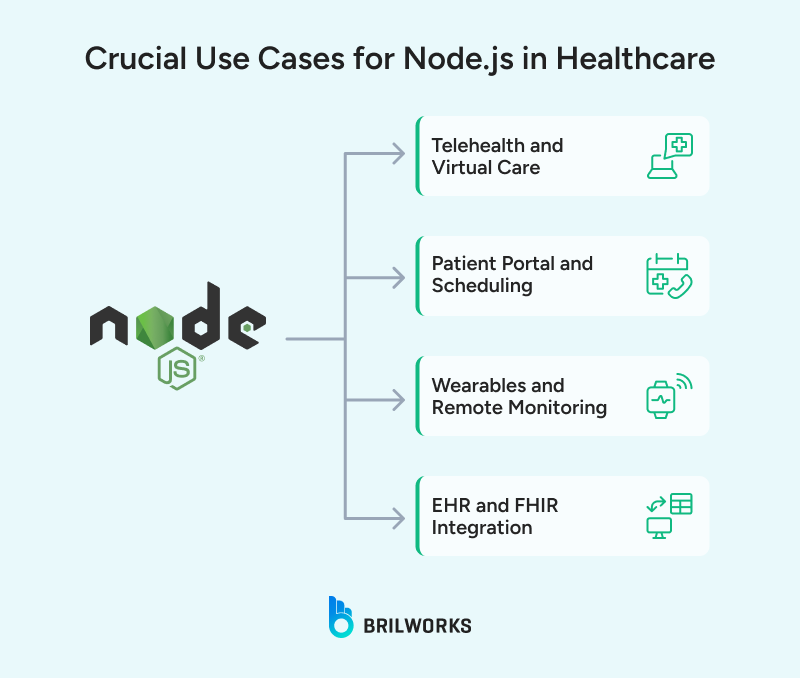COOPERATION MODEL
ARTIFICIAL INTELLIGENCE
PRODUCT ENGINEERING
DevOps & Cloud
LOW-CODE/NO-CODE DEVELOPMENT
INDUSTRY
FRONTEND DEVELOPMENT
CLOUD DEVELOPMENT
MOBILE APP DEVELOPMENT
LOW CODE/ NO CODE DEVELOPMENT
EMERGING TECHNOLOGIES








Healthcare software development comes with unique challenges. Modern systems need to process huge amounts of patient data, connect with different departments, and stay compliant with strict regulations. Choosing the right technology becomes a key decision, because it can determine how reliable and scalable a healthcare application turns out to be.
Today, developers have many choices. Python, Java, and .NET are widely used in the healthcare industry. Node.js has emerged as another strong option. It is a runtime environment that allows developers to use JavaScript for both the backend and frontend. This unified approach often reduces effort, cuts down costs, and helps teams deliver faster.
For a deeper dive into how Node.js is structured, you can explore our guide on Node.js architecture best practices.

Today, developers have many choices. Python, Java, and .NET are widely used in the healthcare industry. Node.js has emerged as another strong option. It is a runtime environment that allows developers to use JavaScript for both the backend and frontend. This unified approach often reduces effort, cuts down costs, and helps teams deliver faster.
See Also: Lessons from Top Tech Companies for Building Healthcare Apps

When you are considering technologies for healthcare projects, the main questions are:
What are the benefits of using Node.js?
How does it stand apart from other popular technologies?
Can it help build reliable and scalable healthcare applications?
The following sections address these questions in detail.
Healthcare systems must handle multiple requests at once, from patient records to lab reports. Node.js processes requests asynchronously, which means it can respond quickly even when the load is high. This makes it suitable for environments where continuous real-time data access is essential.
Node.js is designed to perform well under pressure. Unlike traditional blocking architectures that slow down when demand spikes, Node.js keeps working efficiently. This can make a real difference in emergency scenarios where healthcare systems cannot afford downtime.
|
Traditional Blocking |
Node.js Non-Blocking |
|
Sequential request processing |
Simultaneous request handling |
|
Higher latency under load |
Maintained performance under load |
|
Resource-heavy with many users |
Efficient resource use |
|
Systems slow during crisis |
Consistent response times during surges |
Hospitals and healthcare providers often need to expand their systems as new departments, services, or technologies are added. Node.js supports microservices architecture, which divides applications into smaller, independent services. Billing, scheduling, and clinical documentation, for example, can be built as separate services. If one fails, the others keep running. This makes healthcare systems both flexible and resilient.
Node.js can help reduce costs in two ways. First, a single Node.js server can manage the kind of load that might otherwise require multiple servers with other technologies. Second, since both backend and frontend can be built with JavaScript, development teams save time and avoid switching between languages.

Telemedicine requires handling real-time video streams and interactive sessions. Node.js is well suited for these applications because of its ability to manage concurrent connections smoothly. For this reason, many telemedicine platforms using Node.js have emerged in recent years.
Patients want fast access to information. With Node.js, appointment portals can update availability instantly as slots are booked or cancelled. This allows patients to see real-time schedules without reloading pages and also supports notifications for changes.
Wearable devices generate continuous data, which needs immediate processing to be useful. Node.js can help in developing applications that either run on wearables or handle incoming streams from them, supporting real-time health monitoring.
Interoperability is one of healthcare’s biggest challenges. Node.js works well with JSON and asynchronous operations, making it suitable for integrating electronic health records. Developers can build FHIR-compliant systems that transfer medical records securely and efficiently, ensuring data flows between systems without interruptions.
Encryption and Data Protection
Node.js supports libraries that enable data encryption. For healthcare, this means adding multiple layers of protection for patient information.
HIPAA and GDPR Compliance
Compliance requires more than just security. Applications must include audit trails, logging, and proper handling of sensitive data. Node.js can be adapted to meet these requirements.
Role-Based Access Controls
Different users need different permissions, from doctors and nurses to administrators. Node.js allows developers to build detailed access control systems that support secure workflows.
Choose the Right Frameworks and Libraries
A reliable healthcare application depends on frameworks with proven security records. The right choice will also make long-term maintenance easier.
Implement DevOps and CI/CD
Healthcare systems need continuous availability. CI/CD pipelines ensure that updates are tested, validated, and rolled out without interrupting services. Automated testing can even simulate critical scenarios like dosage calculations.
Conduct Regular Code Audits
Code audits are essential to find and fix vulnerabilities. In healthcare, this is even more important because data security is tied directly to patient safety.
Healthcare organizations usually combine new applications with existing systems. Node.js can play a key role in these integrations.
REST APIs provide structured access to patient data, while GraphQL can simplify complex queries. Node.js frameworks such as Express make it easier to build and manage these interfaces.
For developers exploring modern design choices, our detailed post on Node.js architecture best practices is a good resource.
See Also: GraphQL vs REST
High-volume healthcare data needs to be managed carefully. With Node.js, background tasks such as insurance verification or reminders can be handled through message queues, leaving the main system free to focus on patient care.
Older healthcare systems often use formats that are not directly compatible. Node.js supports ETL processes that transform and synchronize data, for example converting HL7 messages into FHIR resources.
See Also: Bringing AI into Your Node.js Projects? What You Need to Know
Specialized healthcare Node.js development services include building telemedicine platforms, integrating FHIR, designing patient portals, and ensuring HIPAA compliance. Working with experienced Node.js development firms in the healthcare industry helps organizations deliver projects faster, maintain compliance, and create systems that scale as medical needs evolve.
If you are considering extending your team, our guide on hiring Node.js developers explains what to look for in the right talent.
Node.js provides healthcare organizations with a platform that supports real-time data processing, scalable architecture, and strong security practices. Its event-driven model helps applications manage unpredictable demand, something that is common in medical settings.
As healthcare continues moving toward connected devices, AI diagnostics, and integrated data systems, Node.js offers a foundation that can support these innovations. Its ecosystem also makes it easier to build user-friendly interfaces and integrate machine learning.
To turn these possibilities into reality, organizations need development expertise that combines healthcare knowledge with technical skill. This is where Brilworks can help.
With experience in over 50 healthcare solutions, including telemedicine apps and FHIR integrations, we bring a proven track record. If you are looking to hire Node.js developers for your healthcare project, our team can help you design and deliver secure, scalable applications tailored to your needs.
Node.js is a leader in healthcare. It allows patient data to be processed instantly with its event-driven design. Additionally, Node.js is designed to handle large numbers of simultaneous connections.
Node.js allows you to manage a lot of active users at one time and with very limited resources. Node.js is an efficient architecture for developing systems needing speed and scalability.
Node.js has wide compatibility for APIs, DB systems, and communication standards. As a result,developers can integrate newer capabilities into existing healthcare environments.
Get In Touch
Contact us for your software development requirements
Get In Touch
Contact us for your software development requirements